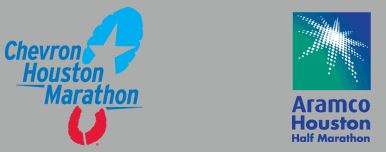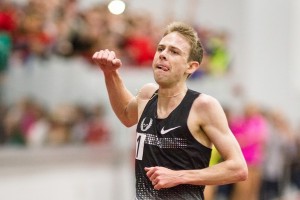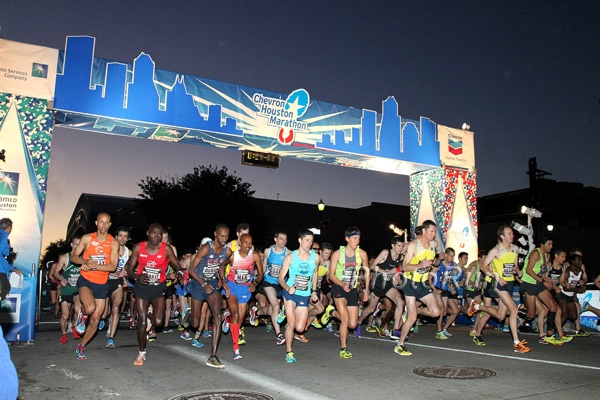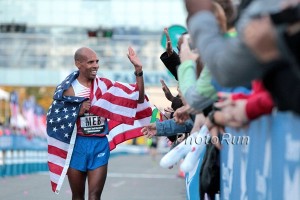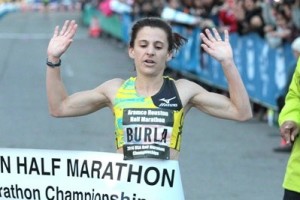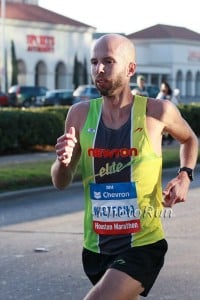Putting Galen Rupp’s Record In Perspective, A Record-Setting Day In Houston, Mo’s London Competition, And A Mexican Finally Breaks 2:10
The Week That Was – January 13 – 19, 2014
by LetsRun.com
January 21, 2014
Previous versions of the Week That Was can be found here.
****
Race A Or Race B?
One of our goals here at LetsRun.com is to get you to think. We like to do Runner A vs. Runner B where we ask you to compare two runners with their names removed so biases can be removed as well. In that light, please compare the following two races and tell us which one is superior.
| Race A | Race B | |
| Distance | 5,000m | 5,000m |
| Date of Race | 10 weeks before Worlds | 7 weeks before Worlds |
| Time at 4,600m | 12:00.93 | 12:00.27 |
| Last 400m | 54.02 | 60.99 |
| Finishing Time | 12:54.95 | 13:01.26 |
Which one is superior?
We imagine everyone on the planet would say, “Race A” by a long shot.
Okay, would you still say race A if we told you Race A was outdoors and Race B was indoors?
We imagine nearly everyone would still say, “Still Race A. It features a last 400 of 54-flat. whereas Race B’s last 400 was 7 seconds slower. That’s not even in the same league.”
Well, Race A was Yenew Alamirew‘s 12:54.95 win in Rome last June and Race B was Galen Rupp‘s American indoor record in Boston last week.
Rupp fans, take a deep breath. We’re not saying Rupp’s American record wasn’t impressive. It most certainly was. These aren’t apples to apples comparison, as this was Rupp’s first race of the year and he went out and crushed an American record.
We’re just trying to give a little perspective.
(With perspective in mind, one astute visitor wants us to poins out, Rupp beat Alamirew at both the Olympics and the World Championships at 5000m)
Do you remember back in November, 1,500 Olympic silver medallist Nick Willis told LRC he actually thought indoor tracks are faster than outdoor tracks until you get well under 60 seconds per lap: Are indoor tracks faster than outdoor tracks? Nick Willis says yes*. What say you?.
Willis’ belief doesn’t seem so crazy now. After all, the second placer in Rupp’s Boston race, Sam Chelanga, set a lifetime 5,000 PR in the race. Yes, Sam Chelanga ran 13:04 indoors.
The best run of Galen Rupp’s life statistically, was the 7:30.16 Galen ran last year indoors. Rupp has shown he can run incredibly fast indoors.
We know one thing, Rupp’s 13:01 was a lot more exciting because it was run indoors in January than if it came in, say, in the middle of the outdoor season. Setting records is great, but for the casual fans, setting records and winning is even better.1
We present to you:
4 Reasons Why Indoor Track Is Better Than Outdoors
1) There is perfect weather with no wind every time.
2) Small crowds can be loud and look larger.
3) You get splits every 200.
4) There is an X Games element to it – more contact/fighting for position.
Of course the #1 negative with indoor track is, you can’t really run the men’s 100 (or as fast in the 200 as outdoors) in it and the men’s sprints are the #1 event for the casual fan.
Glad to see Galen really focusing on indoors. He could walk away a World Champion. Last year, he left outdoor Worlds without a medal.
More: Are indoor tracks faster than outdoor tracks? Nick Willis says yes*. What say you?
*Galen Rupp Breaks American Indoor 5,000 Record – Runs 13:01.26 In Boston
*5 Thoughts After Galen Rupp’s American 5,000 Record And Mary Cain’s World Junior Indoor 1,000 Record
1 At Prefontaine in 2012, Galen closed in 58 the last lap and finished third in 12:58.
*LRC Archive: 2012: 2013 Rome Golden Gala 5000: Yenew Alamirew Stuns Hagos Gebrhiwet
*LRC Archive: 2012: Rupp Joins Sub-13 Club, Asbel Kiprop – Mr. Bowerman, Liu Xiang, SRR And Much More
****
A Record-Setting Day By The US Men In Houston
The 2014 USA Half Marathon Championships in Houston on Sunday, which were held as part of the Chevron Houston Marathon and Aramco Houston Half Marathon, were certainly record-setting. 2013 was not a great year for the men’s marathon in the US with only one sub-2:10, but 2014 got off to AN UNREAL START at the 13.1 distance.
Coming into the race, only 23 men in US history had ever run 62:00 or faster, for a total of 41 performances, for the 13.1 distance according to arrs.net.
Well, on Sunday in Houston, a record nine American men ran 62:00 or better, including seven who had never done it before.
The most 62:00-flats or better from Americans in a single race prior to Sunday? Just three in Philadelphia in 1986.
From our limited research, only two other times had two US men even run 62:00 or faster in the same race (2006 New York and 2009 Houston). Now 9 have done it. Wow.
We now present to you the 30 men in US history who have run 62:00 or faster in the half marathon. Those in bold did it at 2014 Houston.
| All-Time US Half Marathon Runners At 62:00 Or Faster – Half Marathon PR/Marathon PR |
| 59:43/2:04:58 (1) Ryan Hall (CA) 14 Oct 1982 14 Jan 2007 Houston TX/USA |
| 1:00:00/2:07:47 (3) Dathan Ritzenhein (OR) 30 Dec 1982 11 Oct 2009 Birmingham ENG |
| 1:00:29a/2:08:56 (2) Abdihakim Abdirahman (AZ) 01 Jan 1977 05 Aug 2007 New York NY/USA |
| 1:00:29.3a/none (3) Galen Rupp (OR) 08 May 1986 20 Mar 2011 New York NY/USA |
| 1:00:39a/2:11:41 (3) Mohamed Trafeh (CA) 13 May 1985 21 Mar 2010 New York NY/USA |
| 1:00:55/2:11:45 (1) Mark Curp (MO) 05 Jan 1959 15 Sep 1985 Philadelphia PA/USA |
| 1:01:00/2:09:08 (1) Meb Keflezighi (CA) 04 Oct 2009 San Jose CA/USA *Ran 61:34 at 2014 Houston |
| 1:01:17/2:05:38 (1) Khalid Khannouchi (NY) 22 Dec 1971 17 Sep 2000 Philadelphia PA/USA |
| 1:01:30/2:12:38 (2) Keith Brantly (FL) 23 May 1962 19 Sep 1993 Philadelphia PA/USA |
| 1:01:30/none (3) Scott Bauhs (CA) 11 May 1986 15 Jan 2012 Houston TX/USA |
| 1:01:32/2:11:31 (1) Paul Cummings (UT) 05 Sep 1953 25 Sep 1983 Dayton OH/USA |
| 1:01:36/none (4) Luke Puskedra (OR) 15 Jan 2012 Houston TX/USA *Ran 61:48 at 2014 Houston |
| 1:01:38/none (2) Aaron Bruan 9 Jan 2014 Houston TX/USA |
| 1:01:41/2:13:14 (3) Josphat Boit 9 Jan 2014 Houston TX/USA |
| 1:01:43/2:12:23 (2) George Malley (OR) 28 Jul 1955 19 Sep 1982 Philadelphia PA/USA |
| 1:01:44/none (4) Tyler Pennel 9 Jan 2014 Houston TX/USA |
| 1:01:47/none (5) Matt Llano 9 Jan 2014 Houston TX/USA |
| 1:01:47/none? (1) Herb Lindsay (MI) 12 Nov 1954 20 Sep 1981 Manchester VT/USA |
| 1:01:47/2:12:09 (4) Bill Reifsnyder (NM) 13 Apr 1962 15 Sep 1985 Philadelphia PA/USA |
| 1:01:47/2:13:29 (5) Jon Sinclair (CO) 04 Sep 1957 15 Sep 1985 Philadelphia PA/USA |
| 1:01:52/2:11:17 (1) Todd Williams (MI) 07 Mar 1969 07 Dec 1991 Orlando FL/USA |
| 1:01:52/2:13:24 (9) Robert Curtis (PA) 28 Nov 1984 18 Sep 2011 Philadelphia PA/USA |
| 1:01:52a/2:11:06 (9) Jason Hartmann (CO) 21 Mar 1981 17 Mar 2013 New York NY/USA |
| 1:01:54/2:13:47 (1) Antonio Vega (MN) 07 Dec 1983 17 Jan 2010 Houston TX/USA |
| 1:01:55a/2:14:23 (6) Joshua Rohatinsky (UT) 07 Mar 1982 21 Mar 2010 New York NY/USA |
| 1:01:56/2:13:26 (7) Shadrack Biwott 9 Jan 2014 Houston TX/USA |
| 1:01:57/2:18:57 (2) Bruce Bickford (MA) 12 Mar 1957 14 Sep 1986 Philadelphia PA/USA |
| 1:02:00/2:11:53 (8) Fernando Cabada 9 Jan 2014 Houston TX/USA |
| 1:02:00/2:14:50 (9) Tim Ritchie 9 Jan 2014 Houston TX/USA |
| 1:02:00/2:09:32 (1) David Morris (CO) 17 May 1970 14 Mar 1999 Yamaguchi JPN |
Bold = Ran 62:00 Or Faster At 2014 Houston
Congrats to all of the men who ran so well in Houston – it’s got us considering making a trip to Copenhagen in March for the 2014 IAAF World Half Marathon Championships.
We added in the marathon PRs to the list above, thinking most would be under 2:10, but that’s not the case. Historical data says don’t expect a slew of sub-2:10s for 2014 because of the 23 men who had run 62:00 or faster prior to Sunday, just six of them are sub-2:10:00 marathoners (26.1%), 12/23 have marathon PRs over 2:10:00 (52.2%) and we believe 5/23 never ran a marathon (21.7%).
More: MB: Was the 2014 USA Houston Half Marathon – the deepest half in US men’s history? 9 men at 62:00 or better?
*2014 Aramco Houston Half Marathon/Chevron Houston Marathon Coverage
****
Big Wins For Burla And Meb
Running is a very top-heavy sport. As it’s been said before, the person winning the race may be a multi-millionaire, whereas the person finishing eighth may barely be scraping by. In that light, lets focus on the men’s winner and women’s winner in Houston – Meb Keflezighi and Serena Burla.
Both wins were much-deserved and have us excited for 2014 Boston as both are committed to Boston 2014 in April.
The win was HUGE for Meb.
2013 was certainly a trying year for Meb. After a DNS in Boston and a disappointing 2:23:48 in New York, a big question regarding Meb entering 2014 was, “Is he done?”
Not too long ago, in 2012 that Meb was 4th in the Olympics and ran a PR, but the weird thing about age and distance runners is once Father Time catches up, sometimes the end is very swift and Meb turns 39 in May. He can’t have a whole lot of time left at the top.
Meb showed he’s not done yet on Sunday as he showed excellent fitness some 13 weeks out from Boston.
As for Burla, the victory in Houston was much-deserved and it erased some painful Houston memories.
While she’s run 2:28 in both 2012 and 2013, Burla has received little fanfare in the US because both of those runs came overseas. In an Olympic year, a 2:28:28 in Korea in March is simply going to get lost in the shuffle. Last year, she ran 2:28:01 – the second-best time for an American all year – but it came in Amsterdam.
The win on Sunday will hopefully generate some much-deserved publicity for Burla as she’s got a great story. Despite the two 2:28s, she’s never had won a US title before Sunday as she twice before was second in Houston – both in 2010 and 2011. In 2012, she passed out in the Olympic Trials in Houston at the 18-mile mark after running with the leaders through halfway as she said “nerves” got the best of her.
Nothing came close to stopping Burla on Sunday as she dominated and won by 1:24.
In case you’ve forgotten or didn’t know, Burla is a cancer survivor who had much of her hamstring removed in 2010 when a cancerous tumor was taken out. To refresh your memory on her great comeback, we suggest you read a story on Burla from last year’s Boston Globe: For cancer survivor Serena Burla, running Boston Marathon is victory in itself.
We loved this excerpt from the piece as it shows just how far Burla has come back from the brink:
“When I was in [Dr. Boland’s] office (before my cancer surgery), he said, I will do everything I can to save your life. He never said, no, you will never run again.”
“A milestone was being able to get off the toilet by myself. I was gung-ho. I said, when can I start therapy? I always was looking to the next step. While being grateful for where I was, I was always thinking, well, maybe …”
More: *2014 Aramco Houston Half Marathon/Chevron Houston Marathon Coverage
*For cancer survivor Serena Burla, running Boston Marathon is victory in itself
****
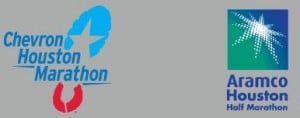 308,000 Reasons To Give Thanks To Houston/Major, Major Thumbs Up To Everyone Involved With The Races In Houston
308,000 Reasons To Give Thanks To Houston/Major, Major Thumbs Up To Everyone Involved With The Races In Houston
Houston hosted the 2012 US Olympic Marathon Trials in 2012. They want to host again in 2016 and are finalists with Los Angeles. USATF is expected to make a decision soon.
One thing we hope that gets taken into consideration is how Houston is supporting US distance running in a big way right now.
The fast running on the men’s side in Houston didn’t come cheaply. Houston paid out time bonuses for any man running under 66:00. That added up to a total of $40,250 in bonus money as an amazing 43 men did it. Throw in $41,500 in prize money and the total is $81,750 for the men’s race alone. The women’s prize money was also $41,500 and their less-deep race resulted in $14,750 in bonus money for a total of $56,250.
Houston paid out $138,000 in prize money and bonuses to the US runners in the half marathon alone.
In the marathon, which included foreigners, Houston paid out $85,000 in prize money for each race. $170,000 in total.
So Houston dropped $308,000 on prize money/time bonuses (plus we imagine some more on appearance fees) last weekend. Very impressive.
For comparison’s sake, the Asics LA Marathon, which didn’t even feel it was important to drug test in 2010, 2011 and 2012 (see here and here) but now suddenly wants to be big time, paid out a total of $160,000 in prize money/time bonuses in 2013. 2014 Houston prize money as reported by Race Results Weekly is below.
| Women’s Marathon 1. Bazu Worku, 23, ETH 2:07:32 $40,000 2. Getachew Terfa*, 30, ETH 2:07:54 20,000 3. Jose Antonio Uribe, 28, MEX 2:08:55 PB 10,000 4. Dadi Yami Gemeda, 32, ETH 2:11:08 6,000 5. Dominic Ondoro, 25, KEN 2:11:43 4,000 6. Kimutai Cheruiyot, 28, KEN 2:13:22 3,000 7. Ian Burrell, 28, USA 2:13:26 PB 2,000 Women’s Half Marathon WOMEN – 1. Serena Burla, 21 1:10:48 $12,000 + 1,500i 2. Lauren Kleppin, 25 1:12:12 PB 10,000 + 1,000i 3. Caitlin Comfort, 24 1:12:16 PB 7,000 + 1,000i 4. Wendy Thomas, 35 1:12:29 PB 5,000 + 1,000i 5. Clara Santucci, 26 1:12:58 PB 3,000 + 1,000i 6. Mattie Suver, 26 1:13:06 2,000 + 750i 7. Tera Moody, 33 1:13:25 1,000 + 750i 8. Stephanie Dinius, 24 1:13:28 PB 750 + 750i 9. Alia Gray, 25 1:13:34 PB 500 + 750i 10. Kara Lubieniecki, 24 1:13:38 PB 250 + 750i 11. Sara Hall, 30 1:13:38 PB 750i 12. Meghan Peyton, 28 1:13:56 PB= 750i 13. Meghan Nelson, 23 1:14:02 PB 500i 14. Allison Morgan, 31 1:14:04 PB 500i 15. Sarah Cummings, 25 1:14:06 PB 500i 16. Melissa White, 21 1:14:06 500i 17. Dot McMahan, 37 1:14:16 500i 18. Katie DiCamillo, 27 1:14:16 PB 500i 19. Ariana Hilborn, 33 1:14:22 PB 500i 20. Renee Bailie, 32 1:14:55 500i |
Men’s Marathon 1. Abebech Bekele, 23, ETH 2:25:52 $40,000 2. Meskerem Assefa, 28, ETH 2:25:59 20,000 3. Gelete Burka, 27, ETH 2:26:03 10,000 4. Biruktait Degefa, 23, ETH 2:26:22 6,000 5. Makda Haji, 25, ETH 2:27:37 4,000 6. Tatiana Aryasova, 34, RUS 2:34:19 3,000 7. Kate Baseley, 29, CAN 2:40:49 PB 2,000 Men’s Half Marathon 1. Meb Keflezighi, 38 1:01:23 $12,000 + 1,500i 2. Aaron Braun, 26 1:01:38 PB 10,000 + 1,500i 3. Josphat Boit, 30 1:01:41 PB 7,000 + 1,500i 4. Tyler Pennel, 26 1:01:44 PB 5,000 + 1,500i 5. Matt Llano, 25 1:01:47 PB 3,000 + 1,500i 6. Luke Puskedra, 23 1:01:48 2,000 + 1,500i 7. Shadrack Biwott, 28 1:01:56 1,000 + 1,500i 8. Fernando Cabada, 31 1:02:00 PB 750 + 1,250i 9. Timothy Ritchie, 26 1:02:00 PB 500 + 1,250i 10. Gabe Proctor, 23 1:02:22 PB 250 + 1,250i 11. Sean Quigley, 28 1:02:46 PB 1,250i 12. Jon Grey, 25 1:02:51 1,250i 13. Ben Bruce, 31 1:02:53 PB 1,250i 14. Scott Macpherson, 26 1:02:56 PB 1,250i 15. Ahmed Osman, 26 1:03:02 PB 1,000i 16. Elliot Kraus, 23 1:03:15 PB 1,000i 17. Tyler McCandless, 27, 1:03:25 1,000i 18. Craig Curley, 25 1:03:27 PB 1,000i 19. Joe Moore, 30 1:03:33 PB 1,000i 20. Joe Gray, 29 1:03:42 PB 1,000i 21. Jeremy Freed, 26 1:03:51 PB 1,000i 22. Enoch Nadler, 28 1:03:55 PB 1,000i 23. Sergio Reyes, 32 1:04:06 750i 24. Brandon Birdsong, 35 1:04:21 PB 750i 25. Dan Kremske, 24 1:04:27 750i 26. Daniel Tapia, 27 1:04:32 750i 27. Craig Leon, 29 1:04:34 750i 28. Anthony Solis, 23 1:04:35 750i 29. Cole Atkins, 28 1:04:37 750i 30. Thomas Dialynas, 24 1:04:49 750i 31. Ben Sathre, 23 1:04:51 750i 32. Mike Reneau, 35 1:04:59 750i 33. EricAshe, 25 1:05:01 500i 34. Gregory Leak, 25 1:05:02 500i 35. Ryan Kienzle, 28 1:05:02 500i 36. Matthew Williams, 26 1:05:06 500i 37. Sean Brown, 26 1:05:22 500i 38. Connor Kamm, 25 1:05:29 500i 39. Jesse Armijo, 31 1:05:38 500i 40. Josh Whitehead, 35 1:05:42 500i 41. Jonathan Mott, 26 1:05:47 500i 42. Jeremy Criscione, 26 1:05:49 500i 43. Kieran O’Connor, 26 1:05:59 500i |
||
As crazy deep as that men’s half marathon race is, Houston still has a way to go to catch up to Japan. Remember at Japan’s Ageo City Half Marathon this year, 71 men broke 64:30.
****
Stat Of The Week
10 years, 3 months 22 days- amount of time that passed between Mexico’s last two sub-2:10 marathons.
Look above and you’ll see that the third placer in Houston in 2:08:55 was Mexico’s Jose Antonio Uribe.
It got us thinking “When’s the last time a Mexican runner broke 2:10?”
LRC founders are old enough to remember when Mexicans won four of five New York City Marathons between 1991 and 1995, and have friends who remember a Mexican setting the 10,000 world record (Arturo Barrios 27:08.23 in 1989).
The last time a Mexican went sub-2:10 in the marathon when 40-year-old Andres Espinosa set the Master’s World Record in the marathon of 2:08:46 in 2003 in Berlin.
The last time a non-40-year-old Mexican broke 2:10 in the marathon was way back in 1998 when German Silva ran 2:08:56 in Boston. 15 years, 9 months ago.
Mexico’s 10 Sub-2:10 Marathoners
2:07:19 Andrés Perez Espinosa- 1994
2:08:28a Arturo Barrios – 1994
2:08:30 Dionisio Cerón – 1995
2:08:55 Jose Antonio Uribe – 2014
2:08:56a Germán Silva – 1998
2:08:57 Alejandro Cruz – 1988
2:09:12 Rodolfo Gómez – 1983
2:09:14 Isidro Rico – 1994
2:09:16 Salvador García – 1992
2:09:41 Martin Pitayo – 1990
People can read The Sorts Gene and talk about genetics advantages and what not, but culture clearly plays a big role in sport. There is no reason marathoning in Mexico and the US should be slower in the year 2014 than 20 or 30 years ago.
****
Quotes Of The Week (That weren’t quote of the day)
#1
Kenenisa Is Training Well
People are known to exaggerate their training logs but if the following is true, LRC is officially excited about Paris. From the AFP:
Kenenisa Bekele said he is currently putting in around 240 kilometres (150 miles) of training per week in preparation, all at altitude.
“If I train well, if I prepare myself very well… I’m not worried about anybody. I will just concentrate on my race to be the best and run fast.”
There is very little chance that Kenenisa Bekele, arguably the greatest track distance runner in history, if healthy isn’t very successful at the marathon. The only question is how do you define successful? The talk about a world record in the marathon in his first attempt is crazy ambitious or just crazy.
If that big talk from Bekele doesn’t impress you, then how about this quote he gave to Athletics Weekly:
“Maybe, who knows, I have the dream to maybe again break the 10,000m world record. My dream is not only [centred] on the Olympics and marathons. I want to try one more world record at 10,000m.”
Bekele hasn’t done much in recent years but he’s still only 31 – just 9 months older than Mo Farah – and the two key things for us are to see a) that he’s healthy and b) that he’s motivated. He certainly is claiming to be both.
#2
Bad Running Journalism?
Last week word came down that a 5k in Jamaica is 3.5 – not 3.1 – miles. Apparently, it has something to do with Jamaica being closer to the equator. From the Jamaica Gleaner:
“All the proceeds from the 5K (3.5 miles) run, walk, and wheelchair event will go towards this year’s three beneficiaries: the Sickle Cell Unit TMRI at the University of the West Indies, and by extension, the Sickle Cell Trust Mandeville, the Special Care Nursery at the University Hospital of the West Indies, and the Jamaica Society for Kids Foundation.”
More: Children’s Health The Focus At 16th Sigma Run
#3
10 Pints The Night Before A Marathon? No Problem
“In an era when the enthusiastic amateur could still excel in athletics, Holden – a dentist by profession – managed to compete at the highest level without sacrificing his passion for real ale. He reputedly drank 10 pints of beer the night before winning the Bermuda marathon in 1979, a race which saw him break Ron Hill’s course record and beat a world-class field that included Charlie Spedding, who would take the bronze medal in the marathon at the Los Angeles Olympics five years later.”
– Excerpt form an obituary on former UK steeplechase record-holder Andy Holden in The Telegraph.
Holden was quite the character. His Wikipedia page reveals while he didn’t accomplish the LetsRun.com near mythical 100 beers, 100 miles, 100 hours feat, he did once do 100 beers and 100 miles in a week. So instead of the 100-100-100, he did the 100-100-168.
More: Obituary For Former UK Steeplechase Record Holder And 1972 Olympian Andy Holden
#4
Focus On Competition/Not Times
“Over the last generation the sport has attempted to market itself via the record books rather than by building personality-driven competitions. But the record books today are a goof, which nobody takes seriously. So trying to market the sport via time is self-defeating.”
– Television commentator Toni Reavis writing a column where he urges race organizers not to focus on time. We 100% agree.
More: Toni Reavis Slams Track And Field’s Focus On Times
#5
Being Married To A Distance-Obsessed Athlete Can Be Tough
“Just as it takes a special person to habitually wake up at 5am in a snow storm to swim 3 Kilometers, or run 22 miles in the rain, or bike 75 miles on an exceptionally windy day, I believe it takes a special person to be married to one of these crazies …
I laugh when he’s standing on our front lawn wearing nothing but compression socks and short shorts, oblivious to the fact that this is a strange outfit to the general population of planet earth. I shake my head when he writes his daily mileage or desired splits with dry-erase marker on our entryway mirror. I shrug my shoulders when he’s snoring with his mouth agape at 8:30 on date night.”
– Excerpt from a great column on 100milesisnotthatfar.com by Stephanie Catudal – the wife of an elite triathlete.
That reminds us of a prominent D1 track coach who met and married his wife in the off-season. Halfway through the first spring she came on and said, “I have no idea whom I’m married to.”
#6
Remember – Never Trust A Canadian
“I told him I did not want this person around my training sessions. I told him I don’t trust people from Canada because they are usually quacks. The person who he says recommended this guy is not good. I told him we would find someone else. The Canadians have a bad reputation.”
– Sprint coach Stephen Francis testifying at the Asafa Powell doping inquiry according to TrackAlerts.com.
More: Powell Says Francis Seemed Happy With Xuereb
#7
Remember, A Full House Looks Better On TV Than An Empty House Even If You Have To Bus In The Fans
“The first few years, Mark Wetmore [the meet director] was paying for school buses to get people to the meet. Now it sells out every year. To his credit, he’s still maintained that commitment, to get people in the local community into the meet. It’s not ‘OK, we’re at this level now, forget about them.’ They still make sure that x amount of tickets get given out to the local high school kids and local community. They don’t have to bus people in anymore, though.”
– Keith McDermott, director of the Reggie Lewis center, talking to RunBlogRun about the strides the New Balance Indoor Games have made over the last 19 years as a pro meet in Boston. They started by busing in fans. Pretty smart as you want things to look good for TV.
****
Weekly Free Training Advice/An Incredible Read
Last week, LRC developed a man crush on 32-year-old US marathoner Scott Wietecha. He certainly belongs in the blue-collar category (they aren’t dead after all) as he’s a teacher, father of two and kicking some butt. On Thursday, we gave an article on him by Jon Gugala QOD status (quote of the day). On Sunday, he came up short of his 2:13 goal in Houston but he did run a 2:17:17 PR to qualify for the 2016 US Olympic Trials Marathon.
Between Thursday and Sunday, we received an email making us re-aware of a great interview of Wietecha by Jeff Edmonds on his Logicoglongdistance.com website. It’s really a must-read. We loved it as it seems Scott’s views on distance running are very similar to ours. He believes in letting the pace come to you naturally on most runs/workouts, but there is a time and a place to trying to hit specific paces, particularly as you get closer to a race. With LRC coaching guru John Kellogg only posting under fake names on the Internet post-2005, it’s the best explanation of how to properly and train drug-free that we’ve seen in a long time.
The entire interview is a must-read as Scott reveals how he went from a super-obsessed, but not super-successful, college runner (14:29 PR we believe) who quickly became a post-collegiate burnout who quit the sport to an Olympic Trials qualifier. Please read it as it’s incredible:
Interview: Scott Wietecha
A few great excerpts:
Chill Out On Your Easy Days:
In college, I was surrounded by teammates, so in workouts, instead of focusing on pace and rhythm, I was trying to run down some guys while staying ahead of others. On easy days, someone would always feel good, so instead of running 7:00-7:45 pace like I do now, we probably ran between 6:00-6:30 pace. If you’re in a class with a bunch of your friends, you’re probably going to be distracted and talk and mess around, rather than focus on the presentation. You’re missing a lot of vital information, so when the test rolls around, you’re going to be in for a surprise. But the quiet nerd who always listens to the teacher is going to be prepared and won’t have as many surprises come test day.
Chill Out In General:
What I learned from my Kenyan teammates is how simple and low-key they are. Americans frequently will try to dissect every little detail of running, question every aspect of their training on LetsRun.com and whine on Facebook if they have a bad workout or race. From my experience, Kenyans just showed up, ran hard and when the workout was over, it was over. They were fierce competitors, but were less emotionally-attached to running and didn’t consume themselves with the sport…If you’re a worry about every little detail and what is always the best thing at the current moment, you’ll crumble when the slightest detail is “off.”
Running Isn’t The Only Important Thing In The World:
I think all of the things going on in my life: fatherhood, teaching, coaching my high school team and people over email, as well as my own running actually helps me some. I don’t really worry about running until it’s time to run. If all I did was run, it would consume me. Those other things keep my mind fresh, my life more balanced and when it comes down to it, my own individual running is a very selfish endeavor. If I put my own running over those things, I wouldn’t be happy with what I was contributing to the world. In life, you either make the world a better place, or a worse one.
More: Interview: Scott Wietecha
*The Hunger Of Scott Wietecha: 32-year old teacher, father of two is dreaming of 2:13 in Houston this weekend
*LRC Archive: The greatest threads in LetsRun history? Yuppie Running vs. Blue Collar Running
****
Two Thoughts On London 2014 Men’s Field
In case you missed it, we had a piece mid-week on the incredible 2014 London men’s field: LRC 6 Thoughts On The 2014 Virgin Money London Marathon Elite Men’s Field – A Win By Mo Farah On April 14th Would Be The Greatest Achievement Of His Career.
Our main thoughts on the field are simple.
1) If Mo Farah, a 3:28 1,500 runner, wins, it will be the greatest accomplishment of his career.
There is no doubt about that in our book. In a major track race, maybe only three people have a small shot of beating him. Not so in the marathon. In the year 2014, in any major, it’s almost always better to take the field. That’s certainly true in London, where there are 6 or 7 men with really good shots of beating Mo.
2) As loaded as the field is, it’s hard to believe that it only features two of the fastest 13 men from 2013 (13 men broke 2:06:00 last year).
Geoffrey Mutai (2:03 PR, London debut), Wilson Kipsang (2:03:23 WR), Emmanuel Mutai (2013 London and Chicago runner-up, 2:03:52 PR), Ayele Abshero (2:04:23 PR), Feyisa Lilesa (2:04:32 PR), Tsegaye Kebede (defending champ, 2:04:38 PR), Stephen Kiprotich (reigning World and Olympic champ), Ibrahim Jeilen (2011 World 10,000 champ, debut ) and Mo Farah (5 global golds, debut ) are all running London 2014 and yet those names only comprise two of the 13 fastest men in 2013.
That just shows you that nearly all of the premiere talent is in the marathon, not the track.
####
Speaking of talent moving to the marathon, did you see who was third in the Houston women’s marathon in 2:26:03? None other than 2008 World indoor 1,500 champ and 2006 World Cross-Country short course winner Gelete Burka. Want proof that there is way more money in the marathon than on the track? Burka is it.
Burka actually ran the 1,500 at Worlds this year in Moscow (went out in the heats), but mainly ran 5,000s on the circuit – she was 8th in Shanghai (14:59.05), 5th at Pre (14:52.93), 4th in Hengelo (14:54.76) and third in Paris(14:42.07) – but that’s a hard way to make a living as her 8th in Shanghai ($1,000), fifth in Eugene ($2,500) and third in Paris ($4,000) (Hengelo isn’t a Diamond League event) only resulted in a total of $7,500 in prize money.
In Houston, she picked up $10,000. And that actually wasn’t her first marathon. She made her debut in Frankfurt in October but was just 12th in 2:30:40.
****
Recommended Reads
*The Hunger Of Scott Wietecha: 32-Year-Old Teacher, Father Of Two Is Dreaming Of 2:13 In Houston This Weekend
*Chronicles Of An Endurance Athlete’s Wife
*Interview: Scott Wietecha
****
Other News Of Note
MB: 2013 NCAA 10,000 Runner-Up Paul Katam Of Kenya Drops Out Of UNGC And Joins US Army He’ll still be trying to get his undergrad and masters degrees but won’t be running collegiately any more.
*LRC Archive: Katam Gets Surprising Second In 10,000 At NCAAs
Nick Willis Starts His 2014 Season Off With A 3:55.98 Mile Win In New Zealand
****
Quotes Of The Day & Last Week’s Homepages:
Note: To see a particular day’s homepage, click on the hyperlink of the date. The hyperlink below the date on the quotes will take you to that particular article – not that day’s homepage.
– Excerpt from our 2014 US Half Marathon Championships recap with Meb Keflezighi speaking after winning in 1:01:23 and showing that even at 38 years old, “Father Time” hasn’t caught up with him yet.
University of Tulsa alum and 2012 NCAA indoor mile champ Chris O’Hare talking about his goal of medalling at the 2014 Glasgow Commonwealth Games in the 1,500.
– Stephanie Catudal blogging about the life of being married to a professional endurance athlete. She talks about how she met her future husband, Tommy Rivers Puzey, when he was on down time recovering from a hip injury and the shocking lifestyle change that came when he got healthy.
– Alberto Salazar telling LetsRun.com (and making our day) that the #1 goal indoors for Galen Rupp, who looked sensational in opening in an American record of 13:01.26 on Thursday night, is to take on the world at World Indoors.
– Excerpt from a piece by Jon Gugala on Scott Wietecha, a 32-year-old teacher and father of two who is dreaming of 2:13 in Houston this weekend. After a disappointing end to his collegiate career, Wietecha, who used to be be maniacal about his diet and recording his workouts to the hundredth of a second, quit running altogether. Now he’s back and maniacal in his races.
– Kenya’s 2011 1,500m World Championships silver medalist Silas Kiplagat calling for lifetime bans for drug cheats.
– Linh Nguyen, former UNC-Greensboro coach (now Toledo coach), talking about NCAA 10,000 runner-up Paul Katam, who has quit UNC-Greensboro and enrolled in the US Army, which will pay for the rest of his schooling.
Questions? Comments? Email us.
